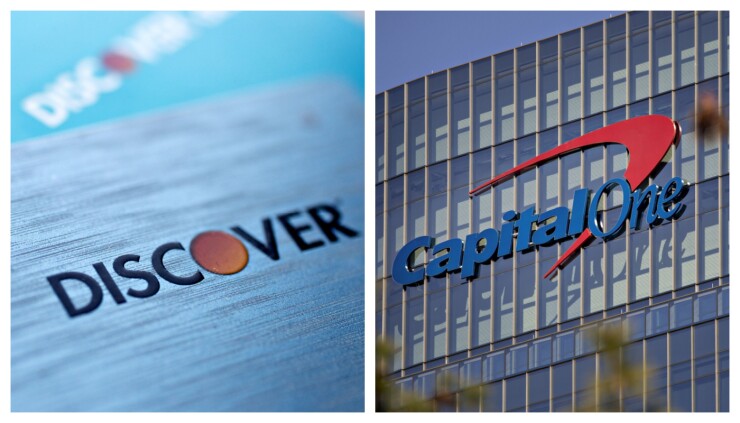
Shareholders in Capital One Financial and Discover Financial Services voted nearly unanimously Tuesday in favor of the combination of the companies, which would create the largest credit card lender in the country.
Capital One is still awaiting regulatory approval to close its $35 billion acquisition of Discover, which it first announced almost a year ago to the day. But the tally of support from stockholders marks another milestone
McLean, Virginia-based Capital One said Tuesday that it still expects the deal to close in early 2025, pending green lights from the Federal Reserve and Office of the Comptroller of the Currency, as well as "customary closing conditions."
Capital One has also
"It's a long labor, but we remain well-positioned to get approval of the deal early this year," Fairbank said.
The termination date of the merger agreement, which had previously been listed as Feb. 19 of this year, has been extended to May 19, per terms of the agreement.
Capital One's proposed acquisition has
Fairbank contends that the absorption of Discover and, importantly, its payment rails, will
In December, Capital One locked down approval from the Office of the Delaware State Bank Commissioner, which oversees the state-chartered Discover.
The two companies have had to clear several other hurdles to get to this point. Discover
But the deal may now be past such snags, due to both the two companies' efforts over the last 12 months, and the potentially less-rigid stance on bank mergers from the Trump administration.
Banking regulators and the Department of Justice must decide whether the blockbuster deal raises antitrust concerns. Looming over their analyses are questions about how broadly or narrowly to define the relevant markets.
While the consolidation-skeptical Biden administration had ramped up scrutiny of big bank deals, Trump-era leaders
On Tuesday, Rodney Hood, who was named acting Comptroller of the Currency earlier this month, said
Ian Katz, managing director at Capital Alpha Partners, wrote in a Tuesday note that the Capital One-Discover deal could be approved before the Senate confirms the OCC's new head and the Fed's vice chair for supervision. The latter role will be vacant as of Feb. 28, if Michael Barr's successor isn't confirmed sooner.






